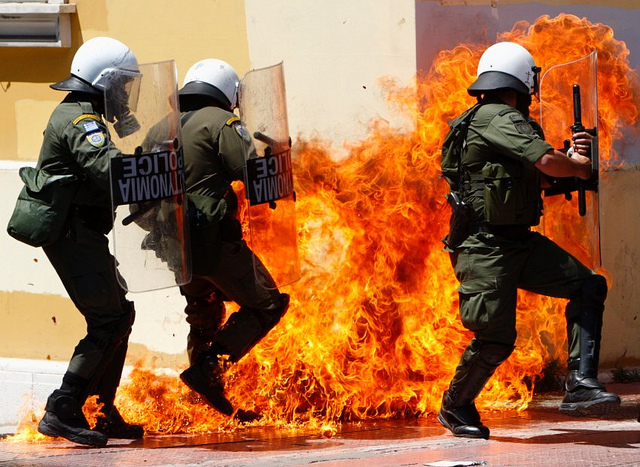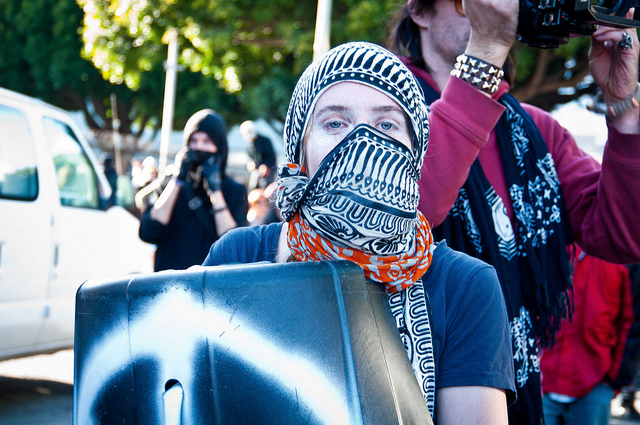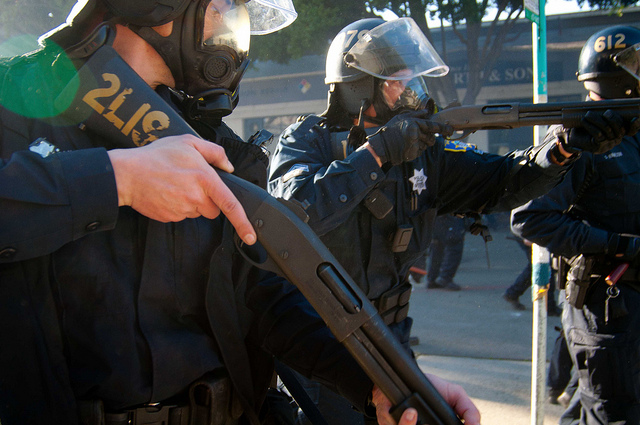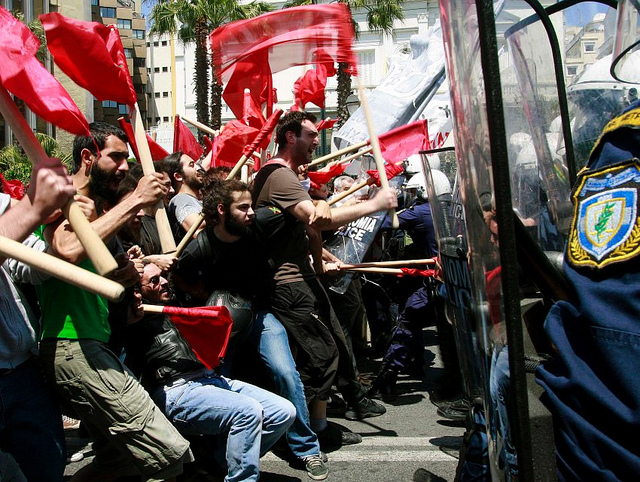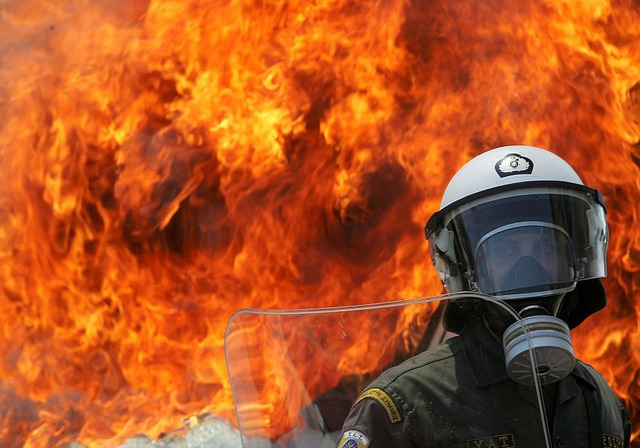|
|||||||||||||
The Philosopher Between the Capitalist and the Communist Chapter 34 : Hello, Emma By Punkerslut
The Philosopher made the right connections. In Athens, he shook the hands of the right intellectuals and the right tavern patrons. He joked about private property, laughed about Hammurabi, and more than once, he was sincere about it. In Solon's city, nobody really knew who this old man was, where he came from, what he wanted, or that he was wanted by the Greek legal authorities for causing revolutions and revolts. They just thought of him as this old man, with interesting ideas, good humor, and stimulating conversation, probably some "dinosaur unionist from back in the days of the coal strike of 1800" or some "editor whose editings have faded away like his writers." He was well-accepted, well-greeted, and well-admired. It took less than a week before he was able to find the location of where Emma and her revolutionaries were located, and apparently, even to the authorities, there was a certain degree of mystery and uncertainty on the exact coordinates. As a soldier in the forests and among the mountains, she was much the same as when she was a worker among the factories and the mines -- elusive and quiet, but loud when morality demanded it and when calculation granted it. And from the core of that urban, Communist people, those angry steelworkers grumbling in the bars and the elitist students sipping coffee at the cafes and the boring schoolteachers waving their rulers, from all of this, the Philosopher departed. His destination was marked. He was looking for Emma. The thorns of brambles and the hooks of bushes each darted at his heels and arms as he walked through that dense vegetation. There was only a limited fear of being picked up by Athenian soldiers, because their locations, destinations, routines, and paths were easily purchased at any corner in the country of Greece, although the fear still existed. The Philosopher could only rely on his senses to guide him past nature's own creations to get to those rebels. But the vague information he was able to collect from the interested voices of Athens were all that he had to get to his destination. He didn't just think it was enough; he felt like it was enough. Not only did his calculations give him confidence; his memories gave him a sense of boldness. "If I was revolting against an authoritarian, top-down system of control and coercion, where would I look to find my refuge among the wilds?" the Philosopher thought to himself, "What rock would look best to hide under, what lake would look best to camp nearby, what elm and pine are most attractive to those fleeing tyranny and looking for their home near liberty? There would need to be some pattern to that type of thinking." He fumbled over vines and tore through tremendous leaves, cautious of his presence, cautious of where any threat might be found, aware of the depth of nature, conscious of the awe in its beauty, always remembering his path, never forgetting where he had been. "I will find you," the Philosopher's thoughts continued like a stream, "You will get out of this awful hell surrounding you." And there, a breach in the sky, a tear of the clouds, of splitting of shadows, black against white and white against black, a small fire broke through that seemingly pierceless top of the earth. Smoke. And where there is smoke, there are people around it -- cooking, eating, talking, living. The Philosopher noticed how it was such a curious smoke, being made in caves near a river with a constant wind gales flushing the local atmosphere out. The smoke from the fires couldn't be seen, except by someone within close distance. "The rebel hideout," the Philosopher said, "I couldn't have pictured nature being this accommodating of Revolution and its adherents. But apparently that must be the case. Whatever plan those rebels had, whether it was to disperse further into the woods up north, or to make a stand in the mountains of the East, they must've given them up, and taken refuge here. They must've needed a moment to breathe." The hooded, old man walked close to the village, cautious of the crushing sounds of pebbles against sand as his sandals brought him closer to the sentries standing guard outside the camp. They spotted him, much sooner than he had predicted, and he stopped in front of them, to show that he had no intention of harming them, but then he kept walking. "Hello, Philosopher," one of them said with a quiet smile. "You're very much welcome here," another said, "Consider our refuge and temporary home to be yours, too." "Every sanctuary deserves to be called a temporary home," the Philosopher smiled, "We are not forever shielded from the elements, so our shielding is only momentary, but we shouldn't forget who we are just because we're vulnerable. Where should I go to find Emma?" "Talk to some of the people around the fire by the riverside," one sentry replied, "They'll bring you to where you need to go." After passing an interview process with some drinking troops and some smoking intellectuals, he was granted access to Emma. "There's a visitor here for you," one confidant introduced the Philosopher, "He's someone you know." The Philosopher walked into a small tent on the side of the mountain, and Emma turned around, her face going from dread to surprise in a single moment. "I knew you'd come!" Emma said. "How could you know that?" the Philosopher smiled. "I had a dream," Emma replied, "And it felt too realistic to be dismissed." "So, what was in the dream?" the Philosopher asked, "Emma?" She looked like she was going to faint for a moment, and then asked, "Did you say... Emma?" "Yes, why?" the Philosopher replied. "It's just... I was positive you had said Cassandra," she said. He smiled, "So, what was in the dream? What made you think I would come back for you?"
"A cautionary disclaimer about the load-bearing weight of a rope is what brought you out of that deep subconscious mind?" the Philosopher's eyebrow raised with his smile. "When I was in real, real, real trouble, when I really needed someone to help me, all I got from those two creatures of the ancient world was a moral lesson about how to live my life," Emma said, "Not one of them would reach their hand out to help pull me out of the muck. They'd each have let me drown in the dirt and mud. They each would be quietly whispering to themselves, 'Maybe death is the best lesson for a rebel.' But you? When you showed up? Not a word, not a question, not a doubt, not something like 'But how did you end up in the hole in the first place?' or 'What are you going to do from now on to guarantee that you won't be in the same situation next month?' Not a thing like that. You gave me your hand. The only words coming from your mouth at that moment were the only ones necessary to save me, and not a bit more. No politics, no economics, no sociology, no history, no lessons, no hopes, no dreams, just the basic functioning of what is needed to get a human being out of a deep hole. I think that's why the dream ended there." "Oh, and what's so special about that part of the dream?" the Philosopher asked, but before his host could entertain a response, the explosion of artillery could be heard from behind them, filling their room with a small cloud of flickering dust. "We should talk more about dreams later. But for now, we should prepare to leave." "You know enough friends to get us out of here?" Emma asked, "All of us? Each and every last Anarchist-Communist soldier here?" "Yes, every last one," the Philosopher said, "I do have friends that I can trust with such a deep responsibility. You know, there are some people out there who actually listen to me when I talk. You are certainly the daughter of Communism. Quick to arms, but not as quick to skepticism." "Do you really need skepticism when you have thought?" "Skepticism is the measurement of thought," the Philosopher said. "That can't be right," Emma replied, "Without thought, I wouldn't have been able to correct my situation." "With skepticism, your situation wouldn't need correcting," the Philosopher smiled, "Now, let's prepare to move the camp up and out, get every last person out of here, nobody left behind. Everyone! I can guarantee your protection -- truth will take the responsibility. It will guide us from the beast's fangs to the safety of a land without either Communists or Capitalists in charge." There was an uncertainty and uneasiness of the crowd outside of Emma's small camping tent. One rebel finally spoke, "What kind of witch have you allowed in the camp, Emma?" "Don't distrust the Philosopher," Emma said, "If we abandon truth, then we will have nothing to defend us in our moment of need."
The group quarreled for almost an hour, but by the end of it, they had all agreed to take up the Philosopher on his offer. They were going to pack up, reorganize their forces, and head South, where a rescue would be provided for by sea captains that were known for having a disrespect for the law, most of them pirates, but more than a few were mutinous crews that had killed their captains and kept on their voyage, except making it a journey of no-return, since they would be executed if they attempted to return home. This was to be the group of vessels that delivered the refugees from the horrors of persecution to a land where there was no suspicion or hatred for those who were somewhat different than the rest. It wasn't going to be Anarchia, but if you walked down its streets, you might be reminded of it. "I remember the dream," Emma thought to herself on her journey to the coast, "I remember it like it's always happening. My heart full of passions united with another individual's intellect full of ideas. There was a complete asymmetry, my desperation and fear, his logic and calculation, my screams of horror, his testing of the rope's strength -- on the one side, heart gnashed itself against everything, and on the other, mind gnashed itself against everything. On the one side there was the struggle for passion, on the other there was the riddle of making human devices achieve human ends. Revolution and Technology. The purely human and the purely inhuman. I am surprised by the fighting power of the first, I am mesmerized by the discoveries of the second. And for a single moment, the two act as one, and maybe the result is something like a civilization. Or should I call it a society? I don't know. I question myself a lot these days, after the fall of Anarchia anyway." The group headed south, the Philosopher not really in the front or in the back, always moderating between the sides and pulsing between the edges, an enigma among the masses, and always side-by-side with Emma. On only a few occasions did they run into patrols from Solon's troops, but these were quick skirmishes that ended in quick and stunning defeats of the Anarchists' enemies. The one side was a group of people fleeing to freedom and safety with their families, the other side was a group of teenagers and young men who had been branded and whipped into submission since childhood. Not a soul in the universe would've placed a bet on the Statists beating the Anarchists under these conditions. A few miserable offspring of Statism with hopes of pride and honors versus many aged soldiers of Anarchism who had twenty years to master the spear while teaching their children literacy and mathematics. Every reason for the first to cower and run, every reason for the latter to risk everything to protect the Anarchist children. The journey to the seas took days, but the Philosopher was always there among the last Anarchist Army. "How often you dream of darkness?" Emma asked, "Or, if you have a dream, where you hear and see nothing, is it still a dream, or is it just sleep?" "If you're going to recollect anything from your past," the Philosopher smiled, "Analyzing it philosophically is the way to get the most out of it." "I remember being so hopeless, so lost, so alone," Emma said, "After both Solon and Hammurabi had passed by the well, I believed so deeply in my heart that it was like the entire world had passed me by, had let me slip down into this crevice, and was about to go on its way, building its empires and reproducing its generations, while I sit and starve to death, every moment becoming an easier victim for predators and getting closer to food for scavengers. Left behind. Totally and completely outside of the bounds of anything vaguely resembling civilization, and dying. A true, deep sense of hopelessness. I sat there thinking about what people might be doing, who might be making families together, which villages might unite together, how there must have been so much activity going on outside, and how I was so isolated, alone, incomplete, something different among them, something different outside of them. And then I discovered Philosophy, or Philosophy discovered me, reached down a rope to me as I was trapped in the hole, and helped pull me out."
"It's a weird type of loneliness," Emma said, "There's really no word to describe that specific loneliness -- there should be a word to describe what it's like to feel forgotten. Malaise, discontent, alienation, ennui, melancholy -- all of these words fail to express what I mean. There's really no sentence or even series of sentences I can use to describe that emotion." "It would take a book, wouldn't it?" the Philosopher smiled. "Yes," she replied, "It probably would take a book. Maybe a novel, maybe non-fiction, but it'll be a different type of book to describe a different type of feeling." "If it was just a dream, then it's the perfect material that books are made from," the Philosopher said. "It wasn't just a dream, though," she said, causing his eyebrow to raise, "Well, it was just a dream, just a thought that came into my head when I was sleeping. But none of it, Hammurabi, Solon, or you make sense without some reference to something factual, without talking about something that really happened. Otherwise, I may as well write a book of poetry, and then nobody would ever understand it." "You probably haven't had the thought that maybe you're the only one with this feeling, I suppose?" the Philosopher asked. "Well, if that were true, I guess that would make me insane, wouldn't it?" Emma smiled. "A lot of things can get you classified under that title, trust me," the Philosopher replied with another smile, "But, you are not alone in that feeling. I understand it, too." "Oh? What makes you understand it so well?" Emma grew curious. "Plenty of things," the Philosopher said, "I'm the Guardian of Truth, I'm a fugitive from the two largest empires on Earth, and I'm the only who might be trusted if I just happened to show up at any village on the planet. There's more, I do have my own past, but there's hardly enough time for all of that. You know as much of me as you need to know for me to get you from here in danger to over there in safety." "Every time I talk about the dream," Emma said, "You always come up with some rational, technically-accurate excuse for us to hurry up and keep going. You should know that I'm hurrying. It's my life and the lives of my people that are hanging from a thread right now." "You walk faster if you don't talk," the Philosopher said. "And what's just convinced you of that?" Emma asked. "Quite a bit," the Philosopher said, "Inaction leads to thought, because there's nothing else to do, but it works in reverse, as well. The more you think, the slower you must move to gather what you're learning. You can't focus on dodging tree roots and prickly bushes at the same time you're holding a philosophical discussion with yourself about loneliness and dreams. In ways, those thoughts can give you energy that you can't get from any other source, but in other ways, they also take away your energy to such an extent that there is no simple way to refill it. Focus on staying alive today, and maybe tomorrow, you can focus on how you live in dreams." "It's always about tomorrow with you," Emma smiled, "I wonder why they call you the Philosopher instead of the Historian." "The Historian couldn't be trusted to protect Truth," the Philosopher smiled back. The group kept together until they finally reached their destination, the safety boundaries of the ships armed with pirates, mutineers, and criminal convicts. It was this bond of trust, between this heavily illegal element and this large family-based army, that was going to establish the terms and basis of their journey. They were both cautious and suspicious of each other, but time and experience reduced this while not wholly eliminating it. Once on voyage, crossing the seas, bringing the Anarchist soldiers and their families to someplace safe, conversation began to roll again. "All right, we've now finally reached someplace that has some resemblance to safety," the Philosopher said, "What's this about a dream that you keep talking on and on about?" "The what?" Emma asked, "Oh, yes, of course. I've already analyzed it." "Oh, you have?" the Philosopher smiled, "I hope it's only the analysis of it that you're done with, and not the memory. Human beings are a dreadful weakness of forgetting all of their dreams, no matter how deeply they think of them. It has to do with how the memories are created, the one from the mind, the other from the experience." "I still remember it," Emma said, "Other dreams may be forgotten, but not this one. I feel like it acts as a compass, even, telling me where I've been and where I need to go." "In what direction is the arrow pointing now?" the Philosopher inquires. "Ever since we got into the boat, it's been spinning between north and south," Emma replied, "Half-way between mind and heart." "How do you navigate with coordinates like that?" "You can't," she said, "You just have to wait for the dream to come back again, I suppose." "You're going to dream again about drowning in a well with Hammurabi and Solon mocking you and I the only one who would save you?" the Philosopher asked, "That sounds unlikely. Next time, it'll probably be a talking ostrich that saves you. Or maybe a crocodile. And it'll be an elf and a dwarf that ignore you. And it won't be a well, it'll be a lake. And you won't need to be saved, you'll need help learning to fly. Dreams are so unpredictable. They have as much variety as you find in human beings. It's not so much that they have a point symbolically, as that they are random and spontaneous, they come from nowhere and are just as quickly forgotten. Meaning, oh yes, they contain that. But proper associations, symbolism, implications, and all of that, you can leave up to the dreamer. Anything beyond what the dream felt like is probably only conjecture." "So what the dream felt like is fact?" Emma asked. "In a way, the fact of how the dream felt was always a fact," the Philosopher replied. "How can I be so sure that the Guardian of Truth has no bias in this area?" Emma asked, "Why would truth have so much to say about what goes on in dreams? How can that which is focused only on the truthful take time to focus on that which is only fictional?" "It's not entirely fictional," the Philosopher, "And that's part of the point. The other aspects of the dream are just details. The real truth is in the substance of the thoughts. It is always there. It has always been there. No matter how much they may look like deformed and disfigured creatures, dreams are all the children of Truth."
|

